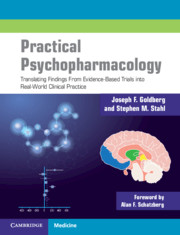 Practical Psychopharmacology
Practical Psychopharmacology Book contents
- Practical Psychopharmacology
- Practical Psychopharmacology
- Copyright page
- Dedication
- Contents
- Foreword
- Preface
- Abbreviations
- Part I General Principles
- Part II Targets of Pharmacotherapy
- 13 Disordered Mood and Affect
- 14 Disorders of Impulsivity, Compulsivity, and Aggression
- 15 Psychosis
- 16 Deficit States and Negative Symptoms
- 17 Anxiety
- 18 Addiction and the Reward Pathway
- 19 Trauma and Post-traumatic Stress Disorder
- 20 Personality Disorders and Traits
- 21 Cognition
- 22 Putting It All Together
- References
- Index
16 - Deficit States and Negative Symptoms
from Part II - Targets of Pharmacotherapy
Published online by Cambridge University Press: 19 October 2021
- Practical Psychopharmacology
- Practical Psychopharmacology
- Copyright page
- Dedication
- Contents
- Foreword
- Preface
- Abbreviations
- Part I General Principles
- Part II Targets of Pharmacotherapy
- 13 Disordered Mood and Affect
- 14 Disorders of Impulsivity, Compulsivity, and Aggression
- 15 Psychosis
- 16 Deficit States and Negative Symptoms
- 17 Anxiety
- 18 Addiction and the Reward Pathway
- 19 Trauma and Post-traumatic Stress Disorder
- 20 Personality Disorders and Traits
- 21 Cognition
- 22 Putting It All Together
- References
- Index
Summary
Swiss psychiatrist Eugen Bleuler, who coined the term schizophrenia, identified affect, association, ambivalence and autism as the so-called “Four As” of negative symptom schizophrenia. Latter-day observers have sometimes added alogia, anergia, anhedonia, and apathy/amotivation to the original list.
Negative symptoms, as classically associated with schizophrenia, refer to the absence of normal function (hence, they are “deficit” states), as contrasted with positive symptoms (that is, the excess presentations of otherwise normal brain functions). In that sense, negative symptoms also differ fundamentally from depression insofar as the latter represents a kind of positive symptom, one characterized by the “feelingful” presence of emotions (anguish, despair) – quite different from the emotional vacancy of flat (rather than sad) affect. The schizophrenia literature often refers explicitly to “the deficit syndrome.”
- Type
- Chapter
- Information
- Practical PsychopharmacologyTranslating Findings From Evidence-Based Trials into Real-World Clinical Practice, pp. 389 - 399Publisher: Cambridge University PressPrint publication year: 2021
